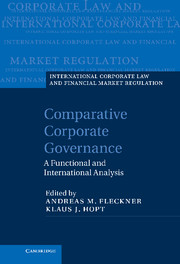4 - Taiwan
Corporate governance of publicly held companies
from A - Australia and Asia
Published online by Cambridge University Press: 05 July 2013
Summary
General information on corporate governance
Definition of corporate governance
Corporate governance could be defined as how a company is structured to improve its strategic management and supervisory systems. In practical terms, the systems are designed and executed in a manner that protects investors' benefits and other stakeholder interests. The goal of corporate governance is to create an optimal structure that lawfully maximizes the company's value. Corporate governance is achieved through the company's management and supervision mechanisms.
Legal basis of corporate governance
The legal basis of corporate governance in Taiwan is primarily found in the Company Act, the Securities and Exchange Act, and their related rules and regulations. The Company Act has rules to protect present and future shareholders and creditors. The Securities and Exchange Act enhances the disclosure and transparency obligations of listed companies. The Corporate Governance Best-Practice Principles for TSEC/GTSM Listed Companies includes many standards for listed companies, but compliance is not mandatory.
Capital market acts
Taiwan’s government and corporate managers regard hostile takeovers as detrimental to corporate governance.
The Securities and Exchange Act regulates the duty of disclosure, the duty of compensation (for example, for making changes to the conditions of takeover without authorization, obtaining the target’s share in other situations, making fraudulent statements in the tender offer prospectus), and the requirements for suspending a public tender offer.
- Type
- Chapter
- Information
- Comparative Corporate GovernanceA Functional and International Analysis, pp. 208 - 232Publisher: Cambridge University PressPrint publication year: 2013

